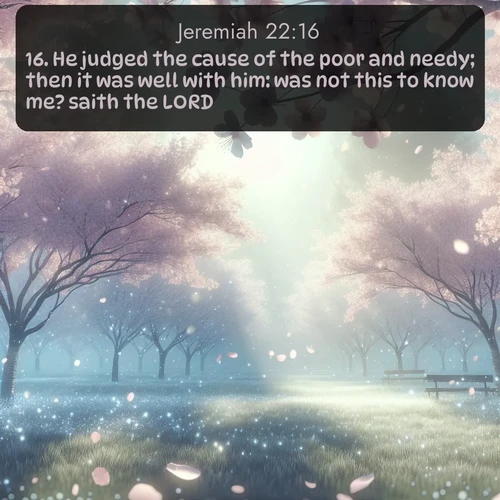Jeremiah 22:16 plusieurs versions / traductions
English Bible Translations
16. He judged the cause of the poor and needy; then it was well with him: was not this to know me? saith the LORD.
16. He judged the cause of the poor and needy; then it was well. Was not this to know me? saith Jehovah.
16. He was judge in the cause of the poor and those in need; then it was well. Was not this to have knowledge of me? says the Lord.
16. He judged the cause of the poor and needy; then it was well. Was not this to know me? saith Jehovah.
16. He judged the cause of the poor and needy; then it was well with him: was not this to know me? saith the LORD.
16. He decided the cause of the poor and needy, Then [it is] well -- is it not to know Me? An affirmation of Jehovah.
German Bible Translations
16. Er half dem Elenden und Armen zum Recht, und es ging ihm wohl. Ist's nicht also, daß solches heißt, mich recht erkennen? spricht der HERR.
16. Ja, wenn man den Bedrängten und Armen zum Recht verhilft, dann steht es gut; heißt solches nicht, mich erkennen? spricht der HERR.
French Bible Translations
16. Il faisait droit au faible et au pauvre, et tout allait bien. N'est-ce pas cela, me connaître? déclare l'Eternel.
16. Il jugeait la cause du pauvre et de l’indigent, Et il fut heureux. N’est-ce pas là me connaître? dit l’Eternel.
16. Il jugeait la cause du pauvre et de l'indigent, Et il fut heureux. N'est-ce pas là me connaître? dit l'Eternel.
16. Il a jugé la cause de l'affligé et du pauvre; alors cela a bien été. N'est-ce pas là me connaître? dit l'Éternel.
16. Il a jugé la cause de l'affligé, et du pauvre, et alors il a prospéré; cela n'était-il pas me connaître? dit l'Eternel.
16. Il jugea la cause de l'affligé et du pauvre; alors il prospéra. N'est-ce pas là me connaître? dit l'Éternel.
Versions with Strong Codes
Jeremiah 22 / KJV_Strong16.
Strong Code definitions
H1777 diyn deen or (Gen. 6:3) duwn {doon}; a primitive roy a straight course,i.e. sail direct:--(come) with a straight course.
H1779 duwn doon from H1777; judgement (the suit, justice, sentence or tribunal); by impl. also strife:--cause, judgement, plea, strife.see H1777
H6041 `aniy aw-nee' from H6031; depressed, in mind or circumstances (practically the same as H6035, although the margin constantly disputes this, making 6035 subjective and 6041 objective):--afflicted, humble, lowly, needy, poor.see H6031 see H6035&volume=KJV_strong' target='_self' >H6035 see H6035&volume=KJV_strong' target='_self' >H6035 see H6041
H34 'ebyown eb-yone' from H14, in the sense of want (especially in feeling); destitute:--beggar, needy, poor (man).see H14
H227 'az awz a demonstrative adverb; at that time or place; also as a conjunction, therefore:--beginning, for, from, hitherto, now, of old, once, since, then, at which time, yet.
H2896 towb tobe from H2895; good (as an adjective) in the widest sense; used likewise as a noun, both in the masculine and the feminine, the singular and the plural (good, a good or good thing, agood man or woman; the good, goods or good things, good men or women), also as an adverb (well):--beautiful, best, better, bountiful, cheerful, at ease, X fair (word), (be in) favour,fine, glad, good (deed, -lier, -liest, -ly, -ness, -s), graciously, joyful, kindly, kindness, liketh (best), loving, merry, X most, pleasant, + pleaseth, pleasure, precious, prosperity, ready, sweet, wealth, welfare, (be) well((-favoured)). see H2895
H3808 lo' lo or lowi {lo}; or loh (Deut. 3:11) {lo}; a primitive particle; not (the simple or abs. negation); by implication, no; often used with other particles (as follows):--X before, + or else, ere, + except, ig(-norant), much, less, nay, neither, never, no((-ne), -r, (-thing)), (X as though...,(can-), for) not (out of), of nought, otherwise, out of, + surely, + as truly as, + of a truth, + verily, for want, + whether, without.
H1931 huw' hoo of which the feminine (beyond the Pentateuch) is hiyw {he}; a primitive word, the third person pronoun singular, he (she or it); only expressed when emphatic or without a verb; also (intensively) self, or (especially with the article) the same; sometimes (as demonstrative) this or that; occasionally (instead of copula) as or are:--he, as for her, him(-self),it, the same, she (herself), such, that (...it), these, they, this, those, which (is), who.
H1847 da`ath dah'-ath from H3045; knowledge:--cunning, (ig-)norantly, know(-ledge), (un-)awares (wittingly).see H3045
H5002 n'um neh-oom' from H5001; an oracle:--(hath) said, saith. see H5001
H3068 Yhovah yeh-ho-vaw' from H1961; (the) self-Existent or Eternal; Jehovah, Jewish national name of God:--Jehovah, the Lord. Compare 3050, 3069. see H3050 see H3069
Prédications qui analysent les thèmes Jérémie 22
Thèmes : Message contre Juda; Promesse de rétablissementRelated Sermons discussing Jeremiah 22
Themes : Message contre Juda; Promesse de rétablissementsee also: Bible Key Verses ; KJV Bible Images, BBE Bible images

